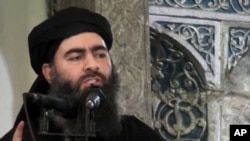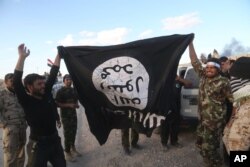Monday marked one year since Abu Bakr al-Baghdadi, the head of the Islamic State group, declared what he called an Islamic "caliphate" stretching across eastern Syria and northern and western Iraq, now one of the deadliest areas on Earth and the focus on an international effort to combat extremists.
The statement calling for Muslims to support the effort vocalized the aspirations of the Sunni militants who have beheaded hostages, conducted suicide bombings, fought Iraqi and Syrian soldiers, and claimed responsibility for terror attacks abroad while drawing in thousands of foreigners to their cause.
They took advantage of the Syrian civil war and political chaos in Iraq to seize major cities across the region including their de facto capital in Raqqa, Syria, as well as Mosul, Ramadi and Fallujah in Iraq.
Their arrival in Syria complicated a now four-year fight between government forces and a wide array of rebel groups, setting off new fronts with the army, militants and rebels all battling for the same territory as the death toll surged past 200,000 people and millions more fled their homes.
Violence in Iraq also spiked, with deaths among the country's overmatched security forces jumping 350 percent from May to June last year. In all, 2014 was by far the deadliest in Iraq since the withdrawal of U.S. combat troops, and this year is on pace to easily surpass that total.
In response, the United States began leading a broad coalition of countries conducting airstrikes against Islamic State targets, beginning in Iraq in August and a month later in Syria. In 10 months, warplanes have carried out 4,800 combined airstrikes, according to Pentagon data, in missions that officials say have helped Iraqi troops and fighters in Syria reclaim some territory from the militants.
"We believe that we have an impact on [Islamic State]," Pentagon spokesman Col. Steve Warren told reporters in Washington on Monday. Despite the loss of a quarter of the land the group seized in Syria and Iraq, however, “they remain a potent force," he added.
Progress has been limited with the Iraqi military still unable to achieve widespread success on the ground in reclaiming major northern and western cities. They have been aided by Iranian-backed militias and Kurdish fighters in operations such as the ongoing effort to take back Anbar province.
So far, U.S. President Barack Obama has resisted calls to send U.S. ground troops back to Iraq, instead deploying advisors and trainers to try to boost the Iraqi troops.
British Prime Minister David Cameron defended his country's participation in the anti-IS air campaign, following the shooting deaths by an IS supporter of dozens of Britons on vacation at a beach in Tunisia late last week.
"I think that frankly, we are a target. They have declared war on us. They are attacking our people at home and overseas whether we like it or not... They are attacking our way of life and what we stand for," Cameron said. "There are people in Iraq and Syria who are plotting to carry out terrible acts in Britain and elsewhere and as long as [Islamic State] exists in those two countries we are at threat."
The Islamic State group's ideological focus has been to go after Shi'ites, whom they consider heretics and apostates, while also killing Coptic Christians in Egypt, Druze in Syria, and Yazidis in Iraq. Their claimed terror attacks include those last week in Tunisia and Egypt, as well as others in Yemen and Saudi Arabia.
Even ancient ruins, shrines and cultural artifacts have been targeted in Iraq and Syria where the militants have swept into cities and towns and destroyed what they considered to be sacrilegious.
World leaders have repeatedly called for a multi-dimensional response that mixes the military action with efforts to cut off financing, halt the flow of foreign fighters and counter the extremists' ability to appeal to a broader audience around the world.





